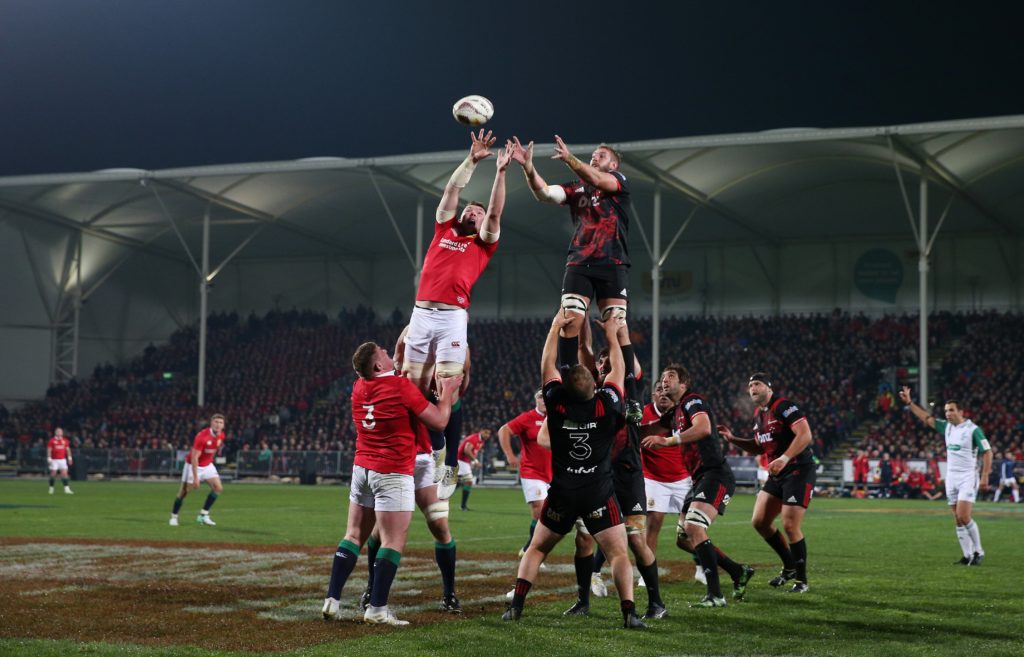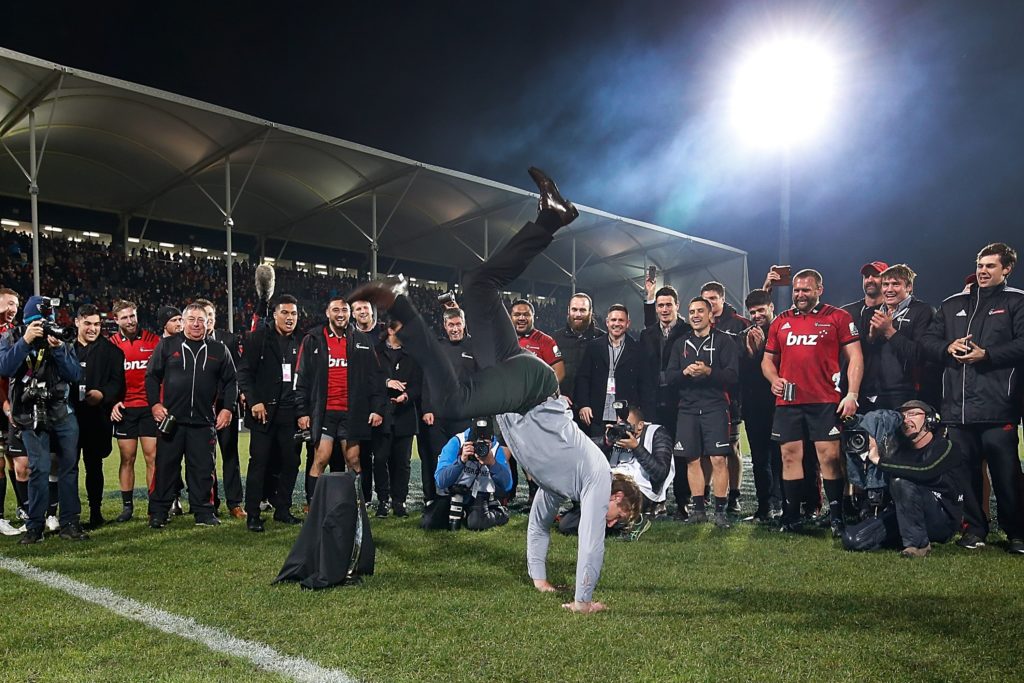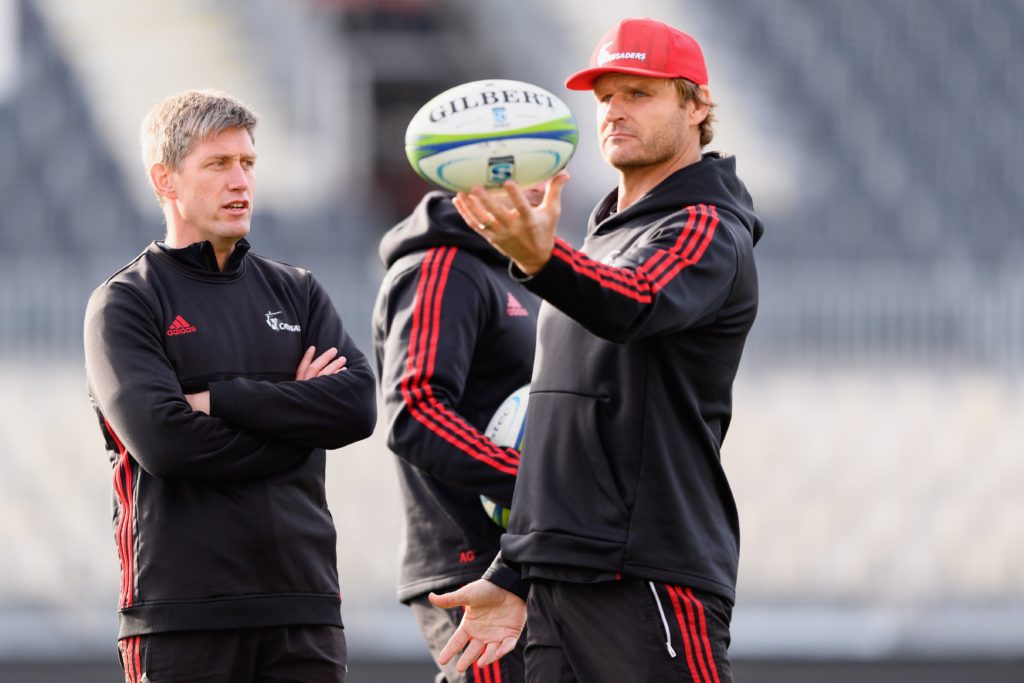Three years ago, Scott Robertson watched his Crusaders team huff and puff but eventually come up short against the British and Irish Lions on a typically cold Christchurch mid-winter evening.
The Lions’ 12-3 victory was a rare setback for a coach in his first year in charge of a club which had responded well to his unique way of doing things.
They were leading the Super Rugby competition at that point and thoughts among the majority of fans in the top half of the South Island, and much further afield, were turning to the real possibility of a first championship victory since 2008.
Their wishes came true of course and have ever since; Robertson winning an unprecedented four titles in a row, including this year’s Super Rugby Aotearoa which was hurriedly pieced together after the coronavirus caused a swift demise to a competition reaching the end of its use-by date.
Back in 2017, Warren Gatland’s men hadn’t exactly set New Zealand on fire at that early stage of the tour. The Lions were less than impressive in beating the New Zealand Barbarians in Whangarei and losing to the Blues in Auckland a few days later, but their defence and discipline proved too good for a Crusaders team containing an All Blacks tight five plus a backline including Richie Mo’unga, George Bridge, Jack Goodhue, Israel Dagg, Seta Tamanivalu and David Havili.
And yet, for a coach desperate to make history, the disappointment was quickly filed away out of sight if not out of mind.
In hindsight the different challenges the Lions provided would have been hugely helpful to the development of all of Robertson’s players and Robertson himself.
In the post-match press conference, as he answered a question alongside his captain Sam Whitelock, someone’s phone began loudly ringing. Robertson stopped. “Wow,” he deadpanned to a media contingent, which quickly broke into laughter.
Wow indeed – next year the man known as Razor could be involved in coaching the Lions against the world champion Springboks.
Timing is as important in humour as it is in coaching and Robertson has more comeback lines than he will probably ever need.
But he also has the knack for delivering the right messages to his players at the right time, and, to a lesser extent (he did miss out on the All Blacks head coaching role to Ian Foster after all), being in the right place to accept golden opportunities.
Whether or not Robertson plays a role with the Lions in South Africa next year depends largely on whether Gatland believes it’s a good idea and whether his fellow Kiwi can convince his Northern Hemisphere employers likewise. Robertson must also get clearance from New Zealand Rugby, which shouldn’t be an issue.
Robertson doesn’t expect a full assistant’s job, but has floated the possibility of assisting defence coach Andy Farrell.
“It wasn’t an assistant role I was wanting, it was a learning opportunity for me, to help out with the professional development and to support the current coaching group. It wasn’t about being an assistant as such,” Robertson said.
Robertson is currently negotiating with New Zealand Rugby on a two-year extension at the Crusaders – he is contracted to the end of next year – and while there is no doubt he would love the opportunity to coach some of the best players in the world in what will be a uniquely intense environment, there is an element of gentle provocation towards New Zealand Rugby in his public interest in a role with the Lions.

He was devastated to miss out on the All Blacks role at the end of last year and the only thing missing from his curriculum vitae after record-breaking success with the Crusaders and Canterbury and the New Zealand Under 20s before that is international experience, so how could New Zealand Rugby stand in his way, given Gatland, after one season at the Chiefs, is taking a year off to oversee the Lions before returning?
Robertson has become expert at knowing which metaphorical buttons to push to get the required results from his players and it’s an intelligence that he appears to be also using on his employer.
It is a gambit that hints at a tough negotiator, a side far less obvious than the blond surfer dude/breakdancer image that he is happy to cultivate.
A couple of summers ago as Super Rugby pre-season training was in full swing, Robertson was photographed on his way to his favourite leisure pursuit.
Whether or not Robertson plays a role in South Africa next year depends largely on whether Gatland believes it’s a good idea and whether his fellow Kiwi can convince his Northern Hemisphere employers likewise.
He gets out on the waves as often as he can near his home in Sumner, a pleasant seaside suburb in Christchurch. It’s early in the morning as he crosses the road with his surfboard under one arm – you can tell that by the golden light and the headlights of the car that’s approaching.
Robertson is ready to go, and, as if the image isn’t already unique for a rugby coach one tier below the highest level, he’s also barefoot and on a skateboard.
Unique because rugby coaches in New Zealand traditionally don’t put themselves in the spotlight like Robertson does.
They don’t agree to a photo-shoot in board shorts and wetsuit vest. They don’t breakdance in the middle of the pitch straight after a championship victory like he does either.
They don’t, at 46 years of age, carry on like they are 20 years younger, but, according to those who have played under him, that’s a key aspect to his success. He’s just himself, pure and simple.
It may not be immediately obvious, but it’s a powerful message. In what is becoming an increasingly homogenised rugby world, Robertson isn’t afraid to express himself, and neither are his players on the pitch; his success at the Crusaders has been built on defence and a fearsomely efficient forward pack, but the ability of all of his players to find and exploit space via their skills, vision, and, importantly, confidence, has become almost second to none.
“He has remained true to himself,” Andy Ellis, the former All Blacks, Crusaders and Canterbury halfback tells The XV.
“What happens with a lot of coaches is that they become a coach and they think they have to behave like a coach. That’s common – ‘I should be sensible now, I should be doing things a certain way’, but what I really like with Razor is that nothing has changed, he’s the same bloke. I don’t know why but that really resonates with me.
“It comes across as really genuine, so when he’s up and speaking in front of the team you know he truly believes what he’s talking about. I reckon that’s how he gets a heap of buy-in from the boys.
“A lot of people change when they get into different roles because they feel they need to act a certain way. But for him, the way he operates with the Crusaders is exactly the way he would have been coaching at Sumner. You’d imagine that it would have been the same at the All Blacks too if he was in that environment.”
The man himself would agree. Early on in his reign at the Crusaders, he said: “This is me. This is the way I have played and coached, as well. The guys have seemed to embrace it. It is just the way it is. They will know if I am pretending. I will just continue to be myself.
“I feel really privileged to do this. I gave the board a clear vision of how I would like to continue that success [with Canterbury and the NZ Under 20s]. I have got my own personality, and that’s who I am.”
It should be stated that Robertson, a former All Blacks and Crusaders loose forward, has also had to work for everything he’s achieved.
He began his coaching career at Sumner, an amateur club near his home that traditionally struggled for players and results and he quickly turned it around.
He then worked alongside Rob Penney at Canterbury – supplementing his part-time salary with public speaking engagements – before becoming a full-time head coach and then replacing Todd Blackadder as Crusaders head coach for the 2017 season.
Blackadder, another former All Blacks loose forward, held the job for eight years but, while extremely unlucky not to win a title in 2011 when his side played every game on the road due to the Canterbury earthquakes, and in 2014 when referee Craig Joubert’s dubious late ruck penalty against Richie McCaw (for which the official later apologised) allowed a grand final victory against the Waratahs to slip away in Sydney, he could not claim the championship he craved as a coach.
What happens with a lot of coaches is that they become a coach and they think they have to behave like a coach… With Razor…nothing has changed, he’s the same bloke. I don’t know why but that really resonates with me.
Former All Black and Crusaders scrum-half Andy Ellis
In Robertson’s first season the Crusaders won the title against the Lions despite having to travel to Johannesburg to do so.
Final wins against the Lions and Jaguares have followed. This year they claimed the Super Rugby Aotearoa title with a win over the Highlanders at their fortress, a former rugby league ground in the suburb of Addington surrounded by scaffold-supported stands put up in 100 days following the 2011 earthquakes in the city.
It is a cold, inhospitable place in winter, even for the team’s own supporters, so you can imagine what it’s like for the opposition given the record the Crusaders have built there.
Before Robertson, no team had won more than three titles in a row and no head coach had won more than two in a row.
The point is, Robertson has built an incredible record but his career hasn’t been without its challenges. He’s had to work hard and he credits his wife Jane, the mother of his three sons, as being a big part of his success.
Jane, for instance, helps Robertson with his dyslexia. “She is incredible; we have been together for 20 years. She understands me, how I work and what message I am trying to get across,” told the Stuff website three years ago.
“She helps to make sense of my thoughts and we have found a way that works best for me in regards to that I am a bullet-point and pictures man. I use pictures so people can get connected – emotionally connected.”

One of Robertson’s greatest qualities is his unwavering optimism. A couple of years ago, the Crusaders were playing the Hurricanes in Wellington with several key players missing.
The newspapers would call it an “injury crisis”. Assistant coach Ronan O’Gara, the former Ireland fly-half, was quietly worried about how his side would cope until he saw Robertson on the morning of the match and was shocked by his mate’s positivity.
The Crusaders won 24-13. O’Gara called it a “lightbulb moment” in his development as a coach.
“I don’t know if I see things differently, but I’m just a natural optimist. I genuinely see the opportunity in stuff,” Robertson said a few months later.
“And that night we had about seven guys out and the team kind of picked itself because they were fit. I said, ‘Nah man, these young guys are going to go good, I can feel it. Good luck to the Hurricanes tonight’.”
Before the final in Johannesburg three years ago, a match in which the Crusaders were underdogs due to the long-haul travel completed only days beforehand, I asked assistant coach Brad Mooar, who now has a similar job with the All Blacks, about Robertson’s qualities, including his easy-going nature.
“He knows the game and is very clear on how he wants it to be played,” Mooar replied. “The group is very happy. It’s an enjoyable team to be a part of and we can have a laugh but it’s well understood that the expectation is you do the work so nobody shirks anything there and Scott’s included in that.”
Former Wales test wing and assistant coach Mark Jones was signed as an assistant by Robertson once O’Gara, who spent two seasons at the Crusaders, left to coach La Rochelle. After one season in Christchurch, Jones believes Robertson is the best coach he has encountered.
“I’ve been lucky to work with a lot of great coaches and holistically, looking at the whole package, he’s the best,” Jones told The Rugby Paper.
“When you look at his knowledge across all areas – set-piece, defence, attack, man-management – you can see why he’s been as successful as he has been. He still wants to get better, though, that’s the great thing about him – we’ve already started talking about how the Crusaders can be better next year.”
Ellis, the man who has the distinction of clearing the ball for the All Blacks against France to seal the 2011 World Cup final for the home side at Eden Park, was coached by Robertson at Canterbury, and played under him and Robbie Deans for the Barbarians.
The former scrum-half, who provided assistance to the Crusaders’ No9s this season, agrees with Jones that there are few coaches with the all-round rugby knowledge that Robertson has.

“He genuinely knows the game inside out and as a head coach that’s hugely important,” Ellis says. “He can sit back and let his attack coach and defence coach and breakdown coach do their things, but he knows those different roles probably better than those specialist coaches.
“If something’s not quite right at the breakdown he might jump in and say ‘hey, you’re right, but if this guy enters from here, we need to be doing this’.
“He is very much the head coach – he controls the culture and all the good things about the team but he knows the game so well he can direct the coaching staff and help coach them too in a lot of ways.
“I think that’s something that’s often missed in a head coach. I found a lot of head coaches can be great with culture, they can be top blokes and get a lot of stuff right, but they might be an amazing ‘D’ coach and not understand everything on attack.
“Or they might be a great attack coach but not really understand how a lineout functions. Razor covers all of that stuff.
“And he isn’t given credit for how hard he works on up-skilling himself. He has a lot of coaching mentors he goes to to make sure he’s on top of his game in terms of rugby. Also he’ll spend time at league clubs and AFL clubs and basketball clubs to understand how they’ve evolved their culture or standards. For someone who shrugs his shoulders and has a bit of a laugh he puts in a lot of research.”
It’s an enjoyable team to be a part of and we can have a laugh but it’s well understood that the expectation is you do the work so nobody shirks anything there and Scott’s included in that.”
All Blacks assistant coach Brad Mooar
When I bring up the possibility of Robertson coaching the Lions next year, Ellis is unequivocal.
“He’d go there to see how things are done in a different environment. He has a growth mindset so he’d be there to learn and add value. He’d be great in whatever capacity he was there for.
“It doesn’t get much bigger than the Lions – it would be a great way to understand that European culture and mindset.”
Robertson didn’t do his customary breakdancing after this year’s championship victory which the Crusaders claimed with a game in hand (against the Blues, subsequently cancelled due to the coronavirus), because of just that reason.
There was another game to play. It was also out of respect for Crusaders prop Oli Jager, an Irishman who was knocked out in a horrible collision in the second half.
“We’ve still got a job to do,” Robertson said.
For Robertson, it’s all about his people and the game. It’s also about a lot of hard work. For the teams he coaches, it’s invariably about having a lot of fun. And winning.



Comments
Join free and tell us what you really think!
Sign up for free